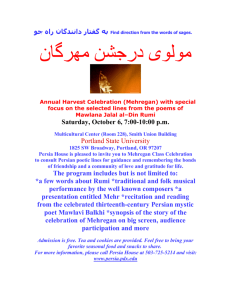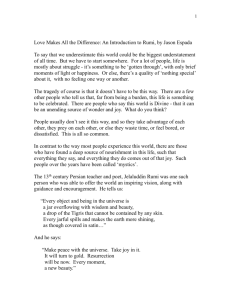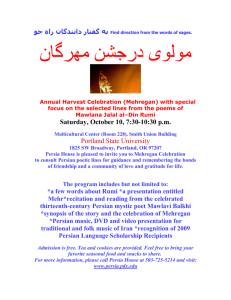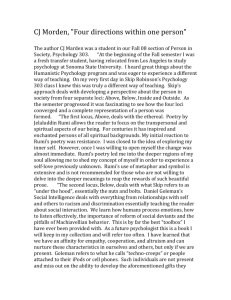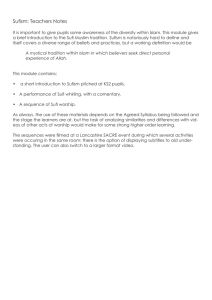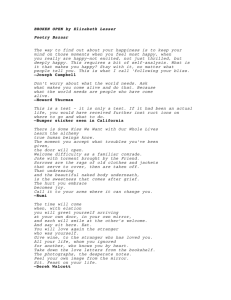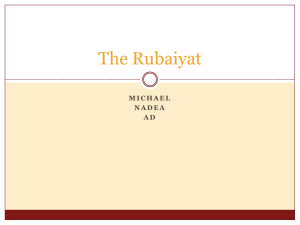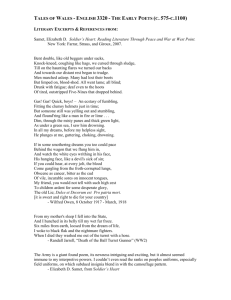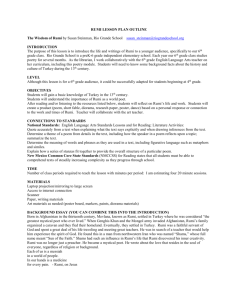The Sufi Doctrine of Rumi: Illustrated Edition
advertisement
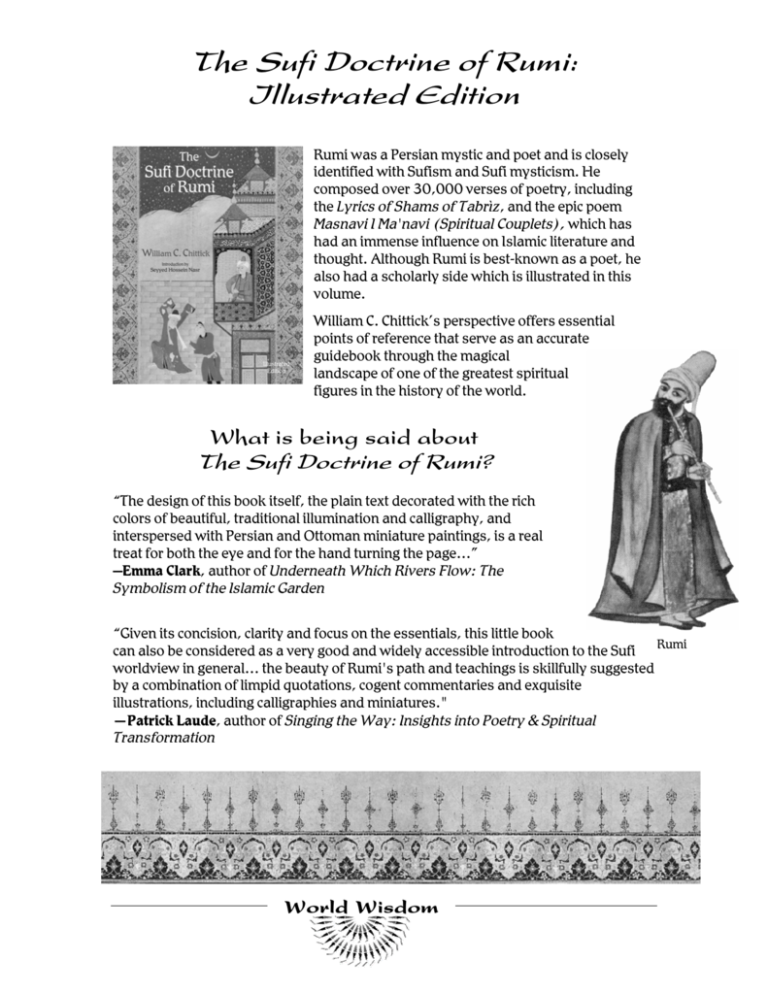
The Sufi Doctrine of Rumi: Illustrated Edition Rumi was a Persian mystic and poet and is closely identified with Sufism and Sufi mysticism. He composed over 30,000 verses of poetry, including the Lyrics of Shams of Tabrìz, and the epic poem Masnavi I Ma'navi (Spiritual Couplets), which has had an immense influence on Islamic literature and thought. Although Rumi is best-known as a poet, he also had a scholarly side which is illustrated in this volume. William C. Chittick’s perspective offers essential points of reference that serve as an accurate guidebook through the magical landscape of one of the greatest spiritual figures in the history of the world. What is being said about The Sufi Doctrine of Rumi? “The design of this book itself, the plain text decorated with the rich colors of beautiful, traditional illumination and calligraphy, and interspersed with Persian and Ottoman miniature paintings, is a real treat for both the eye and for the hand turning the page…” –Emma Clark, author of Underneath Which Rivers Flow: The Symbolism of the Islamic Garden “Given its concision, clarity and focus on the essentials, this little book can also be considered as a very good and widely accessible introduction to the Sufi Rumi worldview in general… the beauty of Rumi's path and teachings is skillfully suggested by a combination of limpid quotations, cogent commentaries and exquisite illustrations, including calligraphies and miniatures." —Patrick Laude, author of Singing the Way: Insights into Poetry & Spiritual Transformation World Wisdom An Excerpt from The Sufi Doctrine of Rumi Despite numerous studies of him [Rumi], until now there has been no clear summary in English of the main points of his doctrines and teachings….For those who know [Rumi] only through the popularizing translations of his poetry, this little book may provide some insight into his universe of meaning. Unlike most Sufi poets, Rumi explains the meaning of his imagery and symbolism. My task is simply to juxtapose various verses and prose passages to let him say what he wants to say. —William C. Chittick Page from a manuscript of Rumi’s Masnavi I Ma'navi Calligraphy of the name Rumi Additional Publication Information The Sufi Doctrine of Rumi also contains: A new Foreword by Seyyed Hossein Nasr A new Preface William C. Chittick Full color Persian and Turkish miniatures, illustrating scenes from Rumi’s life Pages from a manuscript of Rumi’s Mathnawi Traditional Persian design motifs The book has a publication date of October 2005 and has a suggested retail price of $18.95. About the Author William C. Chittick William C. Chittick is one of the most important contemporary translators and interpreters of Islamic mystical texts and poetry. He is also a professor in the Department of Comparative Studies at the State University of New York, Stony Brook. Among his publications are The Self-Disclosure of God: Principles of Ibn al`Arabî's Cosmology (1998), Sufism: A Short Introduction (2000), and The Heart of Islamic Philosophy: The Quest for SelfKnowledge in the Teachings of Afdal al-Dîn Kâshânî (2001). ________________________________________________________________________ Visit the “Press Room” at www.worldwisdom.com for more information. What others have said about William C. Chittick "This study of Dr. Chittick has the great merit... of approaching the subject [of Rumi's metaphysical doctrines] from a strictly traditional point of view untainted by the modernistic fallacies which have colored most of the other studies devoted so far to this subject in Western languages .... [Rumi ] remains to this day a strong living influence in Persian and Turkish cultures and is now becoming a source of spiritual nourishment for seekers the world over. —Seyyed Hossein Nasr, author of The Heart of Islam: Enduring Values for Humanity and Rumi and the Sufi tradition The immense popularity of Rumi's poetry in 21st century America shows that his message is one which transcends both time and space. William Chittick addresses with admirable succinctness the fundamental themes of this message, both in its own terms, and with continuous reference to the school of sophia perennis. The result is a deeply satisfying discourse on Rumi's poetry from a point of view that is faithful to the universality of its essential content." —Reza Shah-Kazemi, scholar and author on Islam and Sufism About the Author of the Foreword Seyyed Hossein Nasr Seyyed Hossein Nasr is University Professor of Islamic Studies at the George Washington University. The author of over fifty books and five hundred articles, he is one of the world’s most respected writers and speakers on Islam, its arts and sciences, and its traditional mystical path, Sufi sm. His publications include Sufi Essays, Knowledge and the Sacred, Religion and the Order of Nature, and A Young Muslim’s Guide to the Modern World. A volume in the prestigious Library of Living Philosophers series has been dedicated to his thought. World Wisdom
